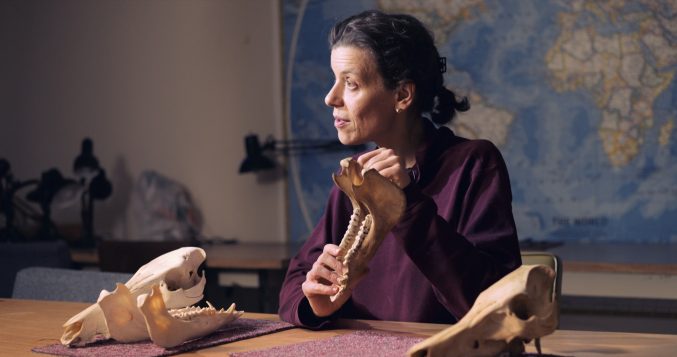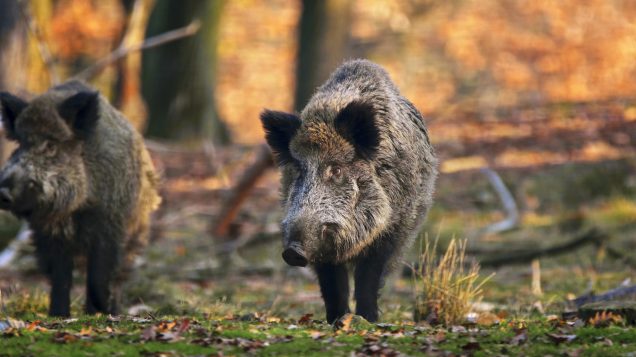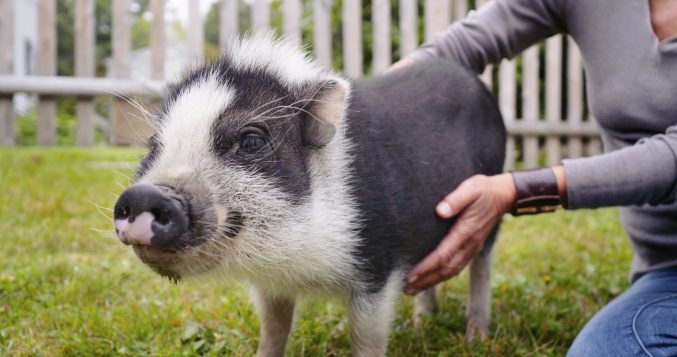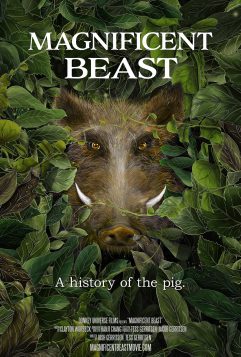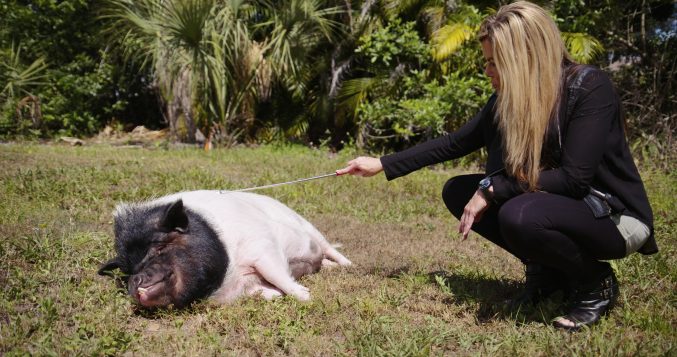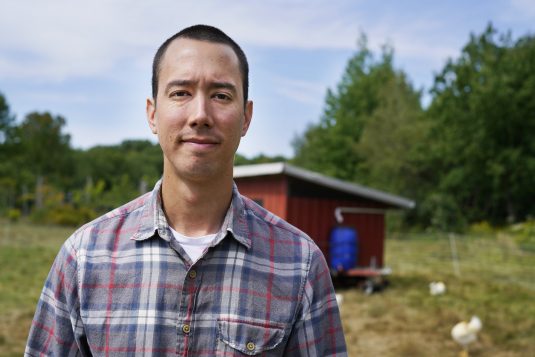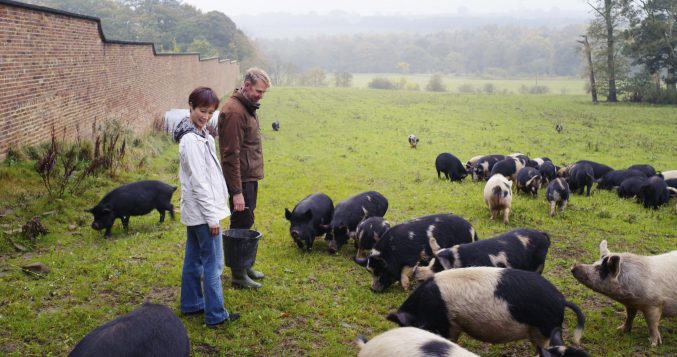By Melissa Arnold
What is the first thing that comes to mind when you think about pigs? Is it this morning’s bacon or your upcoming Easter ham? Maybe you’re picturing a smelly hog rolling in a dusty barn. Or perhaps your religious or personal convictions leave you saying “No thanks!” almost instantly.
Regardless of how you feel about them, there’s no arguing that the humble pig occupies a prominent place in global culture. From farm to table, predator to house pet, pigs are truly all things to all people.
On March 31, PBS stations nationwide will air Magnificent Beast, a captivating documentary that explores the unique ways pigs and humans relate to one another.
Co-directors Tess and Josh Gerritsen, a mother and son duo, traveled across the United States and around the world to capture the whole spectrum of the pig-human dynamic. Along the way, they met chefs, farmers, hunters, archaeologists, historians, and more, each with a unique connection to the animals. At times, their viewpoints differ so much that it’s almost comical to imagine them in a room together. The film’s strength lies not only in that diversity, but in the great care and respect given to each perspective.
The idea for a pig-focused film came to Tess Gerritsen, author of the popular “Rizzoli and Isles” book series, while attending a promotional event in Turkey several years ago.
“I found myself craving bacon for breakfast while I was there, but the majority of Turkish people are Muslim, so you can’t find it there,” Tess explained. “It got me thinking a lot about food taboos. What causes certain foods to become off-limits in a society? As [Josh and I] began to dig deeper, we realized that there was something unique about the status held by pigs.”
Josh Gerritsen began his career in short films and photography, but after a while, he needed a change of pace.
“I thought that I was going to live in New York City forever, but I didn’t have a lot of momentum,” he recalled. “I wasn’t making the world a better place, and that really bothered me. So I decided to move back home to Maine, and spent four years in organic farming. That period was also a major inspiration for Magnificent Beast.”
The pair began research for the film in 2016, with Tess, who has a degree in cultural anthropology, taking the lead. She combed through academic journals in search of people exploring the same issues, and found that many of them were based in the United Kingdom and Egypt.
There’s also a local connection among the featured experts: Dr. Katheryn C. Twiss, an associate professor of anthropology at Stony Brook University.
Twiss’ research focuses on social and economic practices in early agricultural and urban societies. As a zooarchaeologist, she studies animal bones and other remains to learn more about past interactions between humans and animals.
In the film, Twiss explains how pigs have been increasingly domesticated over the course of human history, along with some of the surprising traits that pigs and humans share.
“We were really impressed by the passion Dr. Twiss has for her work, and for pigs in general. It’s clear that she loves what she does, and that was a big part of why we chose to include her,” Tess Gerritsen said.
Dr. Twiss’ curiosity about the ancient world began with an elective class she took early in her undergraduate years.
“Like a lot of people, I had no idea what I wanted to study when I started college. I liked biology, history, languages … and then I took an Introduction to Archeology course and completely fell in love,” she explained. “I thought, ‘Wow, this is awesome! Archeology has everything — I don’t have to choose!’”
Much of Twiss’s research has been on the Neolithic period (between 5,000 and 10,000 years ago) in southwest Asia. In this period, people were first building large communities and relying on foods that they produced or farmed themselves. Pigs were also domesticated at this time. Twiss said that in some Neolithic societies, carved pig tusks were used as personal adornments, and pig bones were embedded in the walls and buried below the floors of homes for symbolic purposes.
“I’m interested in how humans relate to different kinds of animals — how do we obtain our food? How do we feed ourselves, and what rituals are associated with the way we eat? Pigs are environmentally and socially important, just like cattle,” she added.
When the Gerritsens reached out to Twiss about being a part of their film, she was excited and happy to pull a few skulls from the lab for her segment.
“I enjoyed the film’s deeper dive into the social relationships that people have with pigs, especially as pets. It didn’t make me want to get a pet pig, but it did make me want to meet someone with one so I could visit,” she joked. “I hope that Magnificent Beast helps people develop a greater awareness of the many ways in which people interact — or choose not to interact — with pigs. It highlights both the complexity of pigs and the diversity of human cultures.”
To further highlight this complexity, Josh went on social media to find people who interact with pigs on a non-academic level. Using Facebook, he was able to connect with a number of pet pig owners as well as wild hog hunters.
“I made it clear that I wanted to give everyone a fair say, and after a while it led to some really great conversations and a sense of trust,” Josh said.
Ultimately, the Gerritsens were able to meet with members of both groups in person. The pet pig owners taught them more about the deep affection, intelligence and social skills of domestic pigs, while the hunters took them along on a nighttime search for dangerous and destructive wild hogs.
“When people think about pigs, they have a tendency to think of a lazy, sloppy animal, but they are so much more than that,” Josh said. “Our goal is to encourage greater respect and understanding for pigs, and to promote more mindful eating when you do choose to eat pork.”
 Distributed by the National Educational Television Association, Magnificent Beast premieres locally at 10 p.m. Thursday, March 31 on WLIW Channel 21. The documentary will air on PBS stations nationwide (check local listings) and stream on www.PBS.org. For more information, visit www.magnificentbeastmovie.com.
Distributed by the National Educational Television Association, Magnificent Beast premieres locally at 10 p.m. Thursday, March 31 on WLIW Channel 21. The documentary will air on PBS stations nationwide (check local listings) and stream on www.PBS.org. For more information, visit www.magnificentbeastmovie.com.

